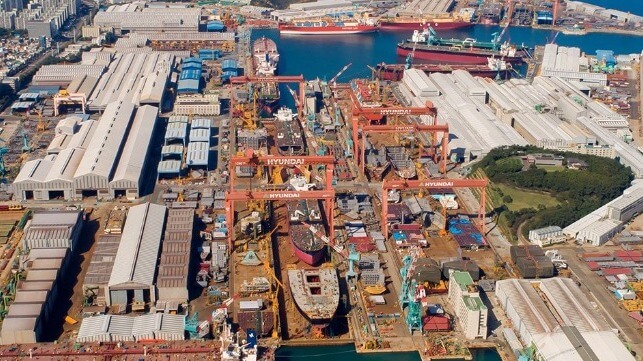S. Korean Yards Turn to Guest Workers, But Some Decide to Walk Away
The reason for the departures, according to the union, is relatively low pay and difficult work - and under the circumstances, "the desertions are not surpising,"
In a scramble to fill vacant positions and build a slew of new shipbuilding orders, South Korea's Big Three have been hiring yard workers in from Thailand, Vietnam, the Philippines and other countries in Southeast Asia. The ranks of foreign guest workers in the yard, but there is one problem: a small number of them are walking away once they arrive in the country.
Guest workers in South Korea are eligible for employment through the country's E-7 visa program. Similar to other nations' work-permit systems, the E-7 visa restricts the holder to a single employer. Nonetheless, the Big Three have reported some disappearances from the ranks of the newly recruited workers. In April, seven Thai workers departed the HD Hyundai yard after just a week on the job. Last fall, about 30 Vietnamese guest workers departed from HD Hyundai, along with another four at Hyundai Samho, according to the shipbuilders' union at HD Hyundai. Korean employers are required to inform immigration authorities of workers who depart and do not return.
The reason for the departures, according to the union, is relatively low pay and difficult work - and under the circumstances, "the desertions are not surpising," the union said in a recent newsletter edition.
A spokesman for HD Hyundai told The Korea Times that this was not correct, and that some workers have left because of "personal matters."
"We are providing various welfare benefits, including interpretation services, counseling, and customized diets to help the workers to adapt to their new environment," HD Hyundai said in a statement.
Foreign workers are an increasing share of the Korean shipyard workforce. Most of the large yards source 10-20 percent of their outsourced (contract) workforce from foreign countries, according to BusinessKorea. Given the growing role of workers from Southeast Asia in the Korean shipbuilding industries, the Korean Confederation of Trade Unions (KCTU) metalworkers' union has decided to switch its policy from opposing migrant labor to organizing migrant labor. As a practical matter, one union leader told BusinessKorea, "the metal workers' union should not give them the cold shoulder but embrace them."
The importance of guest workers may grow further with time. With the ongoing shipbuilding boom, South Korean yards are short about 2,000 workers, according to Korea JoongAng Daily. The working conditions are challenging, and the wages are "not particularly high," explained researcher Lee Kyung-woo of the Ulsan Research Institute. The tens of thousands of workers who were laid off during the downturn in 2016-18 are largely staying away and seeking other options, and it may take up to five years to return to stability and full staffing for the yards.
No comments:
Post a Comment